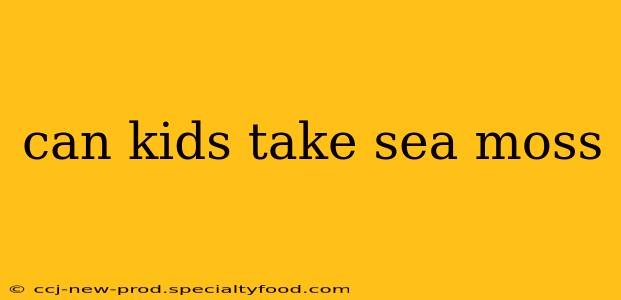Can Kids Take Sea Moss? A Parent's Guide to Sea Moss and Child Health
Sea moss, a type of red seaweed, has gained popularity as a nutritional supplement, touted for its purported health benefits. But can kids take sea moss? The short answer is: it's complicated and requires careful consideration. While sea moss contains various vitamins and minerals, its safety and efficacy for children are not fully established. This article will delve into the considerations parents should weigh before introducing sea moss to their children's diet.
What are the purported benefits of sea moss?
Before we address whether children should consume sea moss, let's understand its claimed benefits. Proponents suggest sea moss is rich in vitamins and minerals, including iodine, potassium, magnesium, and vitamins A, C, and E. These nutrients are essential for growth and development, leading some to believe sea moss can support a child's overall well-being. However, it's crucial to note that these claims often lack rigorous scientific backing.
Is sea moss safe for children?
This is the most crucial question. The safety of sea moss for children is not definitively established through extensive scientific research. Several factors contribute to this uncertainty:
- Iodine Content: Sea moss is a significant source of iodine. While iodine is vital, excessive iodine intake can be harmful, especially for children, potentially leading to thyroid problems. Children's developing bodies are more susceptible to the adverse effects of iodine overload compared to adults.
- Contamination: Sea moss, like other sea vegetables, can absorb heavy metals and other contaminants from the ocean. The level of contamination can vary significantly depending on the source and harvesting methods. Consuming contaminated sea moss can pose health risks to children.
- Lack of Research: There isn't enough robust scientific evidence to definitively state the safety and effectiveness of sea moss for children. Most claims are anecdotal.
What are the potential risks of giving sea moss to kids?
Given the potential for iodine overload and contamination, the risks of giving sea moss to children outweigh the currently unproven benefits. These risks include:
- Thyroid Problems: Excessive iodine can disrupt thyroid function, potentially leading to hypothyroidism or hyperthyroidism. These conditions can significantly impact a child's growth and development.
- Heavy Metal Toxicity: Exposure to heavy metals through contaminated sea moss can lead to various health issues, some of which can be long-term or even irreversible.
- Allergic Reactions: Some children might be allergic to sea moss, leading to allergic reactions ranging from mild to severe.
How can I ensure my child receives necessary nutrients?
Instead of relying on sea moss, parents should focus on providing a balanced and nutritious diet for their children. A diet rich in fruits, vegetables, whole grains, lean proteins, and dairy (or suitable alternatives) will provide all the essential vitamins and minerals children need for healthy growth and development. If you have concerns about your child's nutritional intake, consult a pediatrician or registered dietitian for personalized advice.
At what age can kids take sea moss?
Given the potential risks and lack of research supporting its benefits in children, it's best to avoid giving sea moss to children of any age. A balanced diet and medical advice are always better alternatives.
Are there any alternatives to sea moss for kids' health?
Yes! Focusing on a well-balanced diet is the best way to ensure your child gets the essential nutrients for healthy growth and development. Consult your pediatrician or a registered dietitian for personalized recommendations based on your child’s specific needs and age.
Disclaimer: This article is for informational purposes only and does not constitute medical advice. Always consult a healthcare professional before introducing any new supplement to your child's diet, including sea moss. The information provided here should not be considered a substitute for professional medical guidance.
